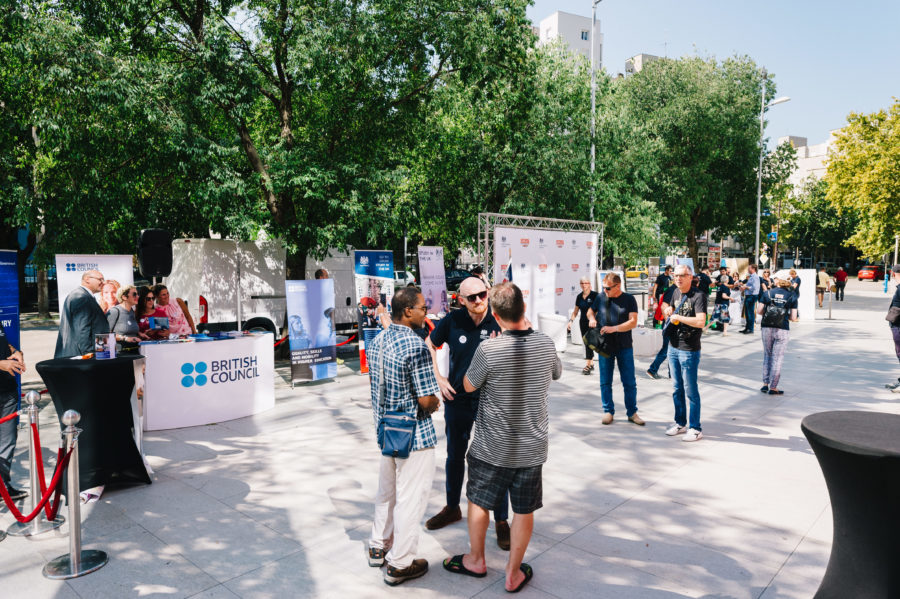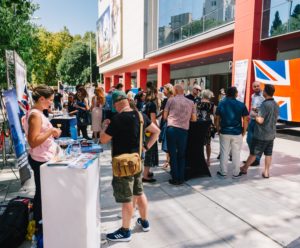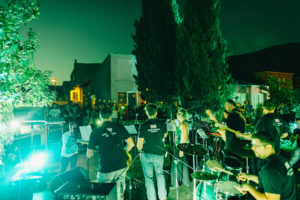31st October 2019
Mostar deserves better

The British Embassy recently moved its whole operation down to Mostar for a day. In addition to many other activities across the city, we set up a ‘pop-up’ reception in front of the Mepas Mall. This gave the chance for different teams to explain our work – defence cooperation, education, projects, scholarships, consular support, political work, and commercial – to people as they stopped by.

Just as importantly, it gave us the chance to ask the citizens of Mostar about their priorities for themselves and the city, the kinds of things that they would like to see change. This is a question we as an Embassy have been asking ourselves and others since I arrived, to try to make sure that our priorities and assistance programmes properly match with the change people in this country want to see. The citizens of BiH are the best judges of how to improve life here, and create opportunities so that no one feels they have to leave to fulfil their and their families’ dreams.
The messages we received in Mostar were largely consistent with what we have heard elsewhere – better education, improved healthcare, roads and other services, less corruption, employment and fairer access to jobs, and better prospects for their children to keep people in the country – with one unique addition. Elections.
Mostar is perhaps the only place in Europe where it has not been possible to hold local elections for more than a decade. The people of Mostar have not had the opportunity to elect their representatives, to reward those who have delivered for them or bring in a replacement who they believe will, since 2008.
It is hard to overstate what a basic democratic failure this is. There are undoubtedly problems with the way elections are run in BiH, and we as the British Embassy are supporting efforts to improve the transparency and fairness of the system, so voters can be more confident in the results. But without elections even taking place in Mostar, there is zero accountability. When there is no oversight by a city assembly eventually something will go wrong, leading to problems like the uncollected rubbish. This is no more palatable because several of my predecessors have made these exact same points.
The European Court of Human Rights agrees. This week they gave their verdict in a case brought by one Mostar resident, ‘Baralija vs Bosnia and Herzegovina’, who argued that she was unable either to vote or stand in local elections. The Court ruled that this was indeed discriminatory, and BiH was responsible for addressing the situation within six months. Although not a surprise, this decision was further confirmation that this failure is not normal or acceptable, especially in a country working to further integrate international and European standards.
Of course this is not the first decision from Strasbourg against BiH. We are approaching the tenth anniversary of the famous Sejdic-Finci ruling, but there have been several others, all requiring fairer treatment of all citizens, regardless of their identity and where their live. And none of these rulings has been implemented, through changes to the way elections are run here.
What does this mean for the people of Mostar? It is another sign that they have not been forgotten, and that they cannot be allowed to remain trapped in this democratic version of Groundhog Day (the film where someone lives the same day again and again and again), where nothing changes. It is a message to BiH political leaders and institutions, that they must work quickly, together and for the greater good, to fix these longstanding and glaring problems in the way elections are run. And it is a reminder to all of us who consider ourselves friends of the people of Mostar, not to lose sight of the crucial and important goal of holding elections in Mostar next year.

We ended our day in Mostar with a concert at the Los Rosales Centre, with the Embassy Band playing to raise funds for their amazing work in support of children and young adults with special needs, as well as to inform the wider public about their new restaurant “Lonato” where those young people work. Many of those we had met during the day across the city came out to show their support for the centre, to sing and dance, and to enjoy each other’s company. It was a reminder of what a great city this is, and how much its people have to offer. I hope we all will help them regain their voice in elections next year.
While it is nice that we are co concerned about ‘civic’ (gradjanskim) pravima of Mostar residents, perhaps it would be nice to remind the general public that Mostar got paralyzed in the first place as a direct consecuence of a decision made by Paddy Ashdown, which was even ruled as NOT- constituitional by the Constituional Court of the Country as it violates directly HUMAN rights of Croats, one of the three constitutional people of the country. And, as I find these rights have a priority above the ‘civic’ ones, I find this is important to point out.
Now, the imposed Statute was literally made in a way that allows Bosniaks to overrule the Croats in the only B-H city where Croats hold a majority. And, all of this was a result of a long-term media and political criminalization of Croats, which as the smallest B-H nation do not have nor the money nor the organized intellectually ability to defend themselves against such propaganda. The culimination of this internationally has been veredict that rules Croats (15% of population) have commited ‘joint criminal enterprise’ against Bosniaks (50%) of population (?!). Nationally, on the other hand, the illegitimate re-election of Zeljko Komsic as a Croatian representative by Bosniaks (you have reports that for instance in Stolac, in places where 2 Croats were registered for voting, Komsic got 148 votes) confirms that Bosnian Croats are the citizens od second order. So, while I salute this concern with ‘civic’ rights, I find more urgent to adress the violation of ‘human rights’ of an entire nation by all the international bodies, which untill now did not raise an eyebrow for these injustices, most likely, due to, again, their own preestablished prejudices towards Bosnian Croats.